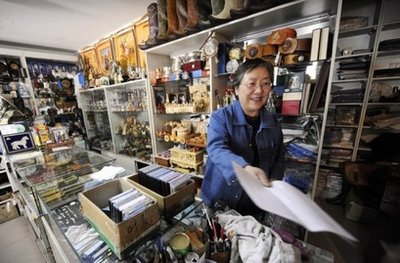 |
|
| Ethnic Mongolian activist Xinna, the wife of jailed dissident Hada, is seen working in her bookshop in Hohhot in China's Inner Mongolia region. Xinna says that since 1995 she has has endured tight controls and harassment by anxious authorities while publicising the plight of her ethnic Mongolian community under China. (AFP/File/Peter Parks) |
For a regime that cares desperately about its image in the world, China's Communist government is breathtakingly insensitive to how its actions appear to other nations. The result for Beijing has been a truly embarrassing public relations blunder.
If Beijing had just kept its mouth shut, the award of the 2010 Nobel Peace Prize to Liu Xiaobo might have passed as just another quirky decision by the Nobel committee. Liu, 54, is largely unknown outside of China and the world of human rights activists. He is serving an 11-year sentence for advocating such heresies as freedom of speech and democratic elections.
But Beijing's reaction to the award was almost comically heavy-handed.
When it failed to bully Norway, where the award is bestowed, by such tactics as breaking off talks on a trade agreement, China resorted to name calling, denouncing the prize as a farce and the judges as clowns. A government brochure said China, with 1.3 billion people, was a big country and deserves a greater voice on world peace than Norway, "a small country with scarce land area and population," which doesn't even rise to the level of a schoolyard taunt.
The Chinese then tried to organize a boycott of the ceremony, using the threat of unspecified "diplomatic consequences." Only 17 nations joined it, including: usual suspects such as Russia, Iran, Cuba and Venezuela; countries such as Pakistan that are heavily dependent on Chinese aid; and countries such as Saudi Arabia, whose own human rights records don't withstand scrutiny. Tellingly, major Asian nations in what China likes to think of as its sphere of influence ― Japan, South Korea, India and Indonesia ― opted to attend the ceremony.
To counter the Nobel Prize, China cobbled together an award of its own, the Confucius Peace Prize. The luster of the honor ― presented Thursday in Beijing ― was somewhat dimmed when the first winner, a former vice president of Taiwan, wasn't there to pick it up, being unaware of both the existence of the prize and the fact that he had won it.
China blacked out the
BBC, CNN and other international
channels during the Nobel ceremony
and cut off Internet access.
Liu was forbidden to attend and the
government made sure no one was in
Oslo to pick up the award on his
behalf. It put his wife and friends
under house arrest, exiling other
acquaintance to the countryside and
preventing anyone suspected of
democratic leanings from leaving
China.
As was repeatedly pointed out, Liu
was the first Nobel laureate
prohibited by his country from
attending the ceremony since Adolf
Hitler barred a German peace
activist. Beijing invited
unfavorable comparisons with
Myanmar's unsavory dictatorship and
the Iron Curtain governments of the
Soviet Union and Poland that at
least allowed the relatives of Aung
San Suu Kyi, Andrei Sakharov and
Lech Walesa to pick up the prizes of
which their countries officially
disapproved.
Thus, in Oslo, the Nobel medal and
diploma were placed on an empty
chair. Nobel Committee chairman
Thorbjorn Jagland called for Liu's
release and said his absence and
that of his family "shows that the
award was necessary and
appropriate." He received a standing
ovation.
The Chinese have an expression for
everything, so surely they have one
for egg all over your face.
Dale
McFeatters is an editorial writer of
Scripps Howard News Service (www.scrippsnews.com).







